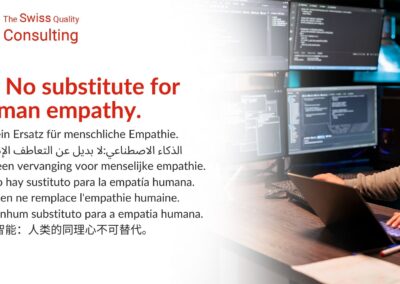Driving Success Through Emotional Intelligence in Saudi Arabia and UAE
The Role of Empathy in Modern Business Leadership
Explore how leaders in Saudi Arabia and the UAE are embedding empathy into their leadership styles to enhance business performance, drive innovation, and build stronger relationships both internally and externally.
Empathy, the ability to understand and share the feelings of others, is increasingly recognized as a crucial component of effective leadership in the business domains of Saudi Arabia and the UAE. In an era where retaining talent and fostering a collaborative workplace are paramount, leaders who exhibit empathy gain a significant competitive edge. This approach not only enhances team morale and productivity but also drives innovation by creating an environment where diverse ideas and perspectives are valued. Leaders in Riyadh and Dubai are integrating empathy into their management styles, seeing it as essential for navigating the complexities of modern business challenges.
Enhancing Leadership Empathy through Executive Coaching
Executive coaching programs across the Gulf region are increasingly focusing on developing empathetic leadership qualities. These programs equip leaders with the skills necessary to understand their employees’ motivations, aspirations, and challenges. Training sessions might include role-playing scenarios, emotional intelligence assessments, and workshops on effective communication. Such initiatives are particularly beneficial in culturally diverse settings like Dubai and Riyadh, where understanding different cultural contexts can improve team dynamics and overall business performance.
Empathy and Technology: Harnessing AI and the Metaverse
Advancements in technology such as Artificial Intelligence and the Metaverse are being leveraged to enhance empathetic practices within leadership. AI tools are used for analyzing employee feedback and sentiment, helping leaders to better understand their teams’ emotional states and needs. Meanwhile, the Metaverse offers a unique platform for immersive and interactive training environments where leaders can practice empathy skills in a variety of simulated social and business interactions. These technologies support leaders in developing a deeper understanding of their workforce, leading to more personalized and effective management strategies.
Building Empathetic Cultures for Sustainable Business Growth
In the business hubs of Saudi Arabia and the UAE, fostering a culture of empathy within organizations is seen as a strategy for sustainable growth. Leaders who prioritize empathetic practices are better equipped to manage workforce diversity, resolve conflicts effectively, and maintain high levels of employee engagement. By actively promoting empathy, companies can not only enhance their internal operations but also boost their reputation externally, attracting top talent and loyal customers who value social and emotional competence in their business interactions.
Empathy as a Strategic Advantage in Customer Relations
Empathy extends beyond internal management and influences how businesses interact with their customers. In regions like Dubai and Riyadh, where personal relationships play a critical role in business dealings, empathetic leadership can transform customer interactions into long-term partnerships. Understanding and anticipating customer needs, responding to feedback with genuine concern, and addressing issues promptly are all practices that stem from empathetic leadership. Such an approach not only improves customer satisfaction but also builds trust and loyalty, which are crucial for business success.
Empathy in Leadership Training Programs
To institutionalize empathy within their leadership ranks, companies in Saudi Arabia and the UAE are incorporating emotional intelligence training into their development programs. These training programs are designed to help leaders and managers not only recognize their own emotions but also respond to the emotions of others in a thoughtful and constructive way. The goal is to develop leaders who can not only lead with authority but also with sensitivity and understanding, making empathetic leadership a fundamental part of the corporate ethos.
Empathy in Cross-Cultural Business Negotiations
In the culturally rich landscapes of Saudi Arabia and the UAE, empathy plays a pivotal role in cross-cultural negotiations. Leaders who are empathetic are more adept at bridging cultural divides, understanding subtle non-verbal cues, and respecting differing business etiquettes and traditions. This capability allows them to forge stronger bonds and create agreements that are beneficial for all parties involved. By practicing empathy, leaders not only facilitate smoother negotiations but also build a reputation for fairness and respect, which are invaluable in international business relationships.
Measuring the Impact of Empathy on Organizational Performance
Progressive companies in Dubai and Riyadh are increasingly keen on measuring the impact of empathy on organizational performance. Through surveys, performance reviews, and feedback mechanisms, businesses are gathering data to assess how empathetic practices influence team cohesion, employee satisfaction, and retention rates. This data-driven approach helps quantify the benefits of empathetic leadership and provides insights into areas where further emotional intelligence development is needed. It also underscores the tangible value of empathy in driving business success, reinforcing its importance as a core leadership skill.
#EmpathyInLeadership, #BusinessLeadership, #SaudiArabiaLeadershipStyles, #UAEExecutiveTraining, #DubaiEmpatheticLeadership, #RiyadhManagementPractices, #EffectiveCommunication, #ExecutiveCoaching, #AIEmotionalIntelligence, #BlockchainInHR, #MetaverseForTraining























